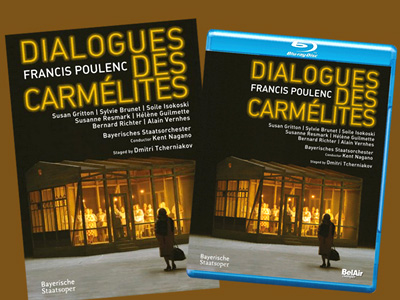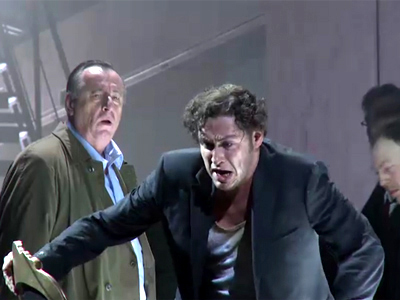
By ANDREW POWELL
Published: August 18, 2017
MUNICH — BelAir Classiques and Mezzo TV have succeeded in getting a ban overturned on their sale and airing, respectively, of a 2010 filmed staging of Dialogues des Carmélites made here at Bavarian State Opera.
The ban, or arrêt, had been imposed in 2015 by the Cour d’appel in Paris following a complaint by heirs of Francis Poulenc and the opera’s source novelist Georges Bernanos.
In that court’s judgment, “the staging by Dmitri Tcherniakov realizes in its final scene a dénaturation of the [opera] and thus infringes the moral rights of authors attached to it.” Dénaturation translates as adulteration or falsification.
Indeed the Russian director substitutes in the climactic scene a deadly gas blast and one self-sacrifice for the serial guillotining of the titular nuns laid out graphically in Poulenc’s music.
But France’s higher Cour de cassation saw the case differently in its June 27 ruling, according to BelAir and Mezzo attorney Judith Adam-Caumeil of Cabinet Adam-Caumeil, a law firm specialized in Franco-German business.
It overturned the ban, she said, because no alteration had been made to libretto or score and the Cour d’appel had admitted that the opera’s essential themes, such as hope, martyrdom, grace, and the communion of saints, dear to Bernanos and Poulenc, had been respected.
Declaring the case a “landmark” with regard to “artistic freedom of staging in French law,” she suggested the ruling would apply equally to “theater, ballet or cinema.”
Not at issue was copyright, even with Dialogues remaining rights-protected in Europe and America, although this status kept BStO and its director from tampering with the words and music.
Adam-Caumeil: “Tcherniakov certainly brought his own vision to the original work by altering the final scene, but the music and text remained unchanged. The essential themes … were respected because the nuns were ready to die … . Thus, no dénaturation of the primary work can be blamed on Tcherniakov.”
BStO joined in appealing the ban. Dialogues most recently appeared on the company’s National Theater stage early last year, in defiance of a letter from the heirs (but not of the ban), and will in 2020 return, said BelAir distributor Naxos in an Aug. 4 statement.
BelAir and Mezzo can now profit from the content as before, and Naxos early this month relaunched BelAir’s DVD along with a new Blu-ray edition.
Illustration © BelAir Classiques
Related posts:
Poulenc Heirs v. Staatsoper
Ettinger Drives Aida
Mélisande as Hotel Clerk
Return of the Troubadour
Kušej Saps Verdi’s Forza

Poulenc Heirs v. Staatsoper
Thursday, January 7th, 2016By ANDREW POWELL
Published: January 7, 2016
MUNICH — Bavarian State Opera will defy the heirs of Francis Poulenc and proceed with revival performances of its literally explosive staging of Dialogues des Carmélites later this month, the company said today.
The 2010 production by Dmitri Tcherniakov departs from the scheme of the composer and the source novelist, Georges Bernanos, in several ways and has been described by the heirs as a “trahison.” Not the least of its transgressions is a substitution in the climactic scene: a deadly gas blast and one self-sacrifice (by Blanche) replace the serial guillotining of the titular nuns laid out graphically in the music.
In a Dec. 23 letter to the Munich company, the heirs demanded that the “rights-infringing staging of the work (ihren Rechten verletzenden Aufführung des Werkes)” be put to “no further use.”
But a slow-won French court victory for the heirs last October constrained only BelAir Classiques and Mezzo TV from, respectively, selling DVDs of the production and screening it. The estates of both Poulenc and Bernanos had begun legal proceedings in October 2012, perhaps not aware of the nature of Tcherniakov’s efforts until BelAir’s DVD release that year. The last onstage revival came, by coincidence, the same month.
Poulenc’s 1956 opera is evidently less tightly controlled, or protected, by his heirs than is, for example, Gershwin’s 21-years-older Porgy and Bess by the American composer’s estate.
In justifying the resolve to proceed, Bavarian State Opera’s Geschäftsführender Direktor Roland Schwab said: “In the context of an earnest grappling with the work, the stage direction must have the freedom to deviate from history. Thus the work is not disfigured, but rather its ideas are depicted from today’s viewpoint.”
The company also noted it had made no alteration to libretto or score. This despite the stripping out of all Christian reference as well as the guillotining from the stage action. BStO Intendant Nikolaus Bachler is a firm, one might say notorious, defender of unfettered Regietheater.
Not only will the show go on, but Bavarian State Opera is supporting BelAir Classiques and Mezzo TV in their appeal of the October court decision, the company said.
Scheduled to sing the opera Jan. 23 to Feb. 1 are Christiane Karg as Blanche, Anna Christy as Constance, Anne Schwanewilms as Lidoine and Stanislas de Barbeyrac as the Chevalier. Susanne Resmark and Sylvie Brunet reprise their roles as Marie and de Croissy on the banned 2010 DVD. Bertrand de Billy conducts.
Photo © Wilfried Hösl
Related posts:
Poulenc DVD Back On Market
Thielemann’s Rosenkavalier
Mélisande as Hotel Clerk
Tonhalle Lights Up the Beyond
Antonini Works Alcina’s Magic
Tags:Bavarian State Opera, Bayerische Staatsoper, BelAir Classiques, Commentary, Dialogues des Carmélites, Dmitri Tcherniakov, Mezzo TV, München, Munich, News, Nikolaus Bachler, Poulenc, Roland Schwab
Posted in Munich Times | Comments Closed